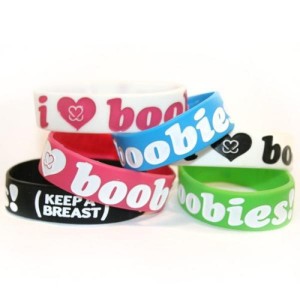 Have you heard about the “I love boobies” bracelet campaign? I’m guessing you have, but if not, you’re hearing about it here, which means it served its purpose.
Have you heard about the “I love boobies” bracelet campaign? I’m guessing you have, but if not, you’re hearing about it here, which means it served its purpose.
Keep A Breast Foundation is a non-profit organization whose goal is to raise awareness of breast cancer – to younger generations. In doing so, they created a saying that sparks a cool, edginess among the younger crowd, jumped on the cancer bracelet wagon, and started selling these colorful, funky rubber bracelets to teens. And they’ve had great success.
Success in the fact that their target audience, teens, are proactively buying these $4 bracelets, and more success than probably expected, in regards to the media attention. Why? Because these bracelets say “I love boobies.”
They quickly became a fad among high school students and just as quickly became the topic of many PTA meetings. Within the past few weeks, schools across the country are banning these controversial bracelets because they feel the message is not appropriate for the kids.
Let’s be real for a minute. First, we have teens who most likely know little about the disease, proactively going to buy the bracelets and in turn are being exposed to a serious message. Secondly, they are talking about the issue with their friends about how it affects them. And lastly, because they are edgy, kids are buying them every day and the profits are supporting the foundation’s programs. I personally think it’s brilliant.
No, I do not have kids. But I do feel I’m pretty conservative when it comes to what children are exposed to these days. But for teachers and principals to refer to these bracelets as terms for sexual harassment is absurd. Some schools are banning them altogether sighting their school’s “dress code” and some are making the students turn them inside out.
A Facebook page has been created where almost 21,500 students are talking to one-another online about how they want to wear them for the women they have lost because of the cancer. Let me say that again. Kids proactively started an online community to talk about health issues. Serious issues that also affect adults but they are doing it openly where principals can’t tell them to stop. They’ve taken this campaign into their own hands. To me, that sounds like every marketer’s dream.
So I ask you, do you love boobies?